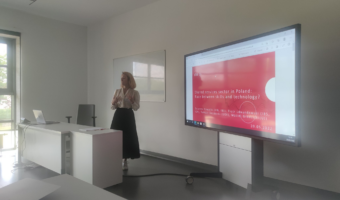The qualitative case study, carried out as part of UNTANGLED, was presented at the Social Boundaries of Work conference in Lublin, Poland on 19-20 May.
As globalisation has led to the outsourcing of administrative functions away from headquarters to developing countries, Central and Eastern Europe, with its young, educated workforce and lower labour costs, has become a hub for business services. The sector has been growing rapidly in Poland, and now accounts for 5.6% of total private sector employment. Yet the intensification of automation poses a challenge for this business model, as a large number of tasks performed at such centres are routine ones that can easily be automated.
Kowalik and her colleagues, including Piotr Lewandowski, Tomasz Geodecki and Maciej Grodzicki, were interested in employees’ attitudes toward automation, including whether they are afraid of losing their jobs, as well as management’s response to the process: are they investing in upskilling and re-skilling, or rather looking toward layoffs and disinvestment?
The study found that employees welcome automation and are not afraid of it process that removes tedious work and frees up resources. Moreover, despite automation, new jobs are being created.
However, some threats remain. With rising labour costs and other macroeconomic headwinds, some processes may easily be relocated away from Poland.
Within UNTANGLED the results of the study will be compared to research on the business services sector in Ireland and South Africa and will feed into policy recommendations and scenarios in a later stage of the project.

